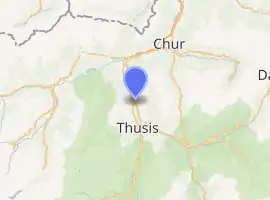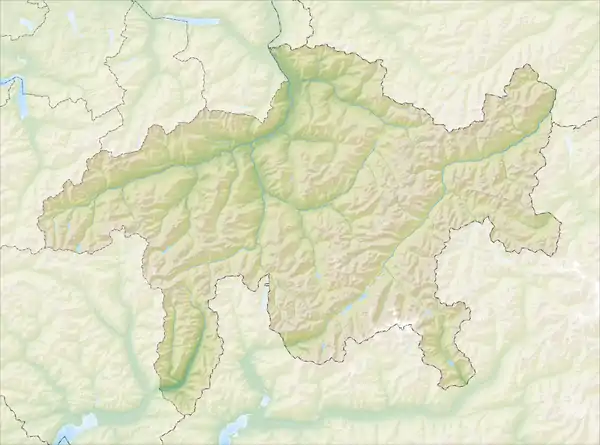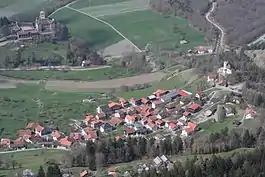Tumegl/Tomils
Tumegl/Tomils is a village in the municipality of Tomils in the district of Hinterrhein in the Swiss canton of Graubünden. In 2009 Tumegl/Tomils merged with Feldis/Veulden, Scheid and Trans to form the municipality of Tomils.[1]
Tumegl/Tomils | |
|---|---|
 | |
 Coat of arms | |
Location of Tumegl/Tomils 
| |
 Tumegl/Tomils  Tumegl/Tomils | |
| Coordinates: 46°45′N 9°26′E | |
| Country | Switzerland |
| Canton | Graubünden |
| District | Hinterrhein |
| Area | |
| • Total | 320 km2 (120 sq mi) |
| Elevation | 801 m (2,628 ft) |
| Population (December 2007) | |
| • Total | 365 |
| • Density | 1.1/km2 (3.0/sq mi) |
| Time zone | UTC+01:00 (Central European Time) |
| • Summer (DST) | UTC+02:00 (Central European Summer Time) |
| Postal code(s) | 7418 |
| SFOS number | 3642 |
| Surrounded by | Cazis, Paspels, Rothenbrunnen, Scheid, Trans |
| Website | www SFSO statistics |
History
Tumegl/Tomils is first mentioned in 1141 as in Tumillis.[2]
Geography

Tumegl/Tomils has an area, as of 2006, of 3.2 km2 (1.2 sq mi). Of this area, 34% is used for agricultural purposes, while 55.8% is forested. Of the rest of the land, 5.3% is settled (buildings or roads) and the remainder (5%) is non-productive (rivers, glaciers or mountains).[3]
The village is located in the Domleschg sub-district, of the Hinterrhein district. It is located on a low terrace on the right bank of the Hinterrhine. In 2009 Tumegl/Tomils merged with Feldis/Veulden, Scheid and Trans to form the municipality of Tomils.[1] Until 1943 Tumegl/Tomils was known as Tomils.[1]
Demographics
Tumegl/Tomils has a population (as of 2007) of 365, of which 5.2% are foreign nationals. Over the last 10 years the population has grown at a rate of 7.7%.[3]
As of 2000, the gender distribution of the population was 51.5% male and 48.5% female.[4] The age distribution, as of 2000, in Tumegl/Tomils is; 48 people or 15.0% of the population are between 0 and 9 years old. 31 people or 9.7% are 10 to 14, and 26 people or 8.1% are 15 to 19. Of the adult population, 24 people or 7.5% of the population are between 20 and 29 years old. 55 people or 17.1% are 30 to 39, 52 people or 16.2% are 40 to 49, and 22 people or 6.9% are 50 to 59. The senior population distribution is 17 people or 5.3% of the population are between 60 and 69 years old, 28 people or 8.7% are 70 to 79, there are 12 people or 3.7% who are 80 to 89, there are 5 people or 1.6% who are 90 to 99, and 1 person or 0.3% who is 100 or more.[5]
In the 2007 federal election the most popular party was the SPS which received 36.8% of the vote. The next three most popular parties were the SVP (28%), the CVP (21.1%) and the FDP (13.4%).[3]
The entire Swiss population is generally well educated. In Tumegl/Tomils about 86.6% of the population (between age 25-64) have completed either non-mandatory upper secondary education or additional higher education (either University or a Fachhochschule).[3]
Tumegl/Tomils has an unemployment rate of 0.87%. As of 2005, there were 12 people employed in the primary economic sector and about 5 businesses involved in this sector. 14 people are employed in the secondary sector and there are 3 businesses in this sector. 18 people are employed in the tertiary sector, with 8 businesses in this sector.[3]
The historical population is given in the following table:[2]
| year | population |
|---|---|
| 1803 | 202 |
| 1850 | 226 |
| 1900 | 233 |
| 1950 | 266 |
| 2000 | 321 |
Languages
Most of the population (as of 2000) speaks German (91.3%), with Romansh being second most common ( 4.0%) and Albanian being third ( 2.2%).[3]
| Languages in Tumegl/Tomils | ||||||
| Languages | Census 1980 | Census 1990 | Census 2000 | |||
| Number | Percent | Number | Percent | Number | Percent | |
| German | 169 | 77.88% | 228 | 87.69% | 293 | 91.28% |
| Romanish | 35 | 16.13% | 17 | 6.54% | 13 | 4.05% |
Heritage sites of national significance
The S. Maria e Maurezzi Church, Burg Ortenstein (Ortenstein castle) and Sogn Murezi (an early medieval church) are listed as Swiss heritage sites of national significance.[6]
 Burg Ortenstein
Burg Ortenstein Aerial view (1947)
Aerial view (1947)
References
- Amtliches Gemeindeverzeichnis der Schweiz published by the Swiss Federal Statistical Office (in German) accessed 23 September 2009
- Tumegl/Tomils in German, French and Italian in the online Historical Dictionary of Switzerland.
- Swiss Federal Statistical Office Archived 4 September 2011 at the Wayback Machine accessed 06-Oct-2009
- Graubunden in Numbers Archived 24 September 2009 at the Wayback Machine (in German) accessed 21 September 2009
- Graubunden Population Statistics Archived 27 August 2009 at the Wayback Machine (in German) accessed 21 September 2009
- Swiss inventory of cultural property of national and regional significance Archived 1 May 2009 at the Wayback Machine 21.11.2008 version, (in German) accessed 06-Oct-2009
| Wikimedia Commons has media related to Tumegl/Tomils. |
External links
- Official website (in German)
- Tumegl/Tomils in German, French and Italian in the online Historical Dictionary of Switzerland.